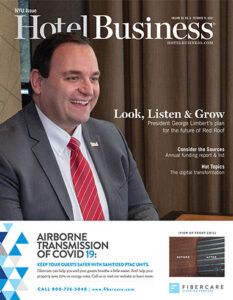New hospitality technologies are emerging so quickly, it’s hard to keep track of them. The industry historically has been one of old-school processes—pad and paper, manual data processing, etc. But the digital transformation is here, and hoteliers must act quickly to find the platforms that work best for their companies and properties.
In the latest Hotel Business Hot Topics session, “The Digital Transformation: The Time to Upgrade is Now!” in partnership with Samsung, panelists discussed how technology is changing the hotel industry, from back-of-house operations to guest services.
Moderated by Abby Elyssa, digital content manager, Hotel Business, the group of panelists included Mark Fancourt, cofounder, TRAVHOTECH; Justin Jabara, president, Meyer Jabara Hotels; Shawn O’Connell, director of sales/head of hospitality, Samsung; and Beth Paschetto, VP, global hotel and owner solutions, IHG Hotels & Resorts.
Meyer Jabara used the COVID-19 pandemic to upgrade its technology platforms, a move, Jabara noted, that will help in the long run.
“We took the time during COVID to upgrade many of the systems that we just didn’t want to upgrade because it was so much work to do,” he said. “We updated our accounting software and put in a new business intelligence platform, which has been about an eight-month integration. Our feeling is that the time is now, and if you take these steps and make this commitment, as business comes back and our industry starts to normalize, there’s a pretty big payoff on some of these bets.”
The company was proactive with the upgrades, something that Paschetto suggests all hoteliers should do because “there’s a cost to not investing that is really important for hoteliers to consider because they’re going to be left behind if they don’t invest.” She added, “It does cost money at a time when a lot of hoteliers are just trying to recover from everything, but if you don’t make it, you’re going to find yourself well behind.”
Fancourt pointed out that “there will only ever be more technology; there will not be less,” adding that the industry will eventually automate everything that it does. “It’s just a question of when you choose to get on the train and do that,” he said. “The sooner you can do it, the sooner you have capability the competition doesn’t have, and that’s a competitive advantage.”
More tech, less human interaction?
While automation will make hotels run more efficiently, it certainly can’t replace the most important part of the industry—the people.
O’Connell put on his business/leisure traveler hat for a moment. “There are points in time where I want to engage with technology, and points where I want to engage with a human,” he said. “It’s a personal preference. If I’m checking into a hotel at 1:00 a.m., I don’t want to stop at the front desk; I want to go to my room. So, there’s an environment where I’m in a situation where mobile key benefits me. Whereas, if I’m going to go to the bar and have a cocktail, I want that human interaction.”
Fancourt said that hotels will survive whether fully automated or not. “If you decide that you want to move to a fully automated environment where there’s no people involved, that’s fine,” he said. “If you decide you want to use technology predominantly to drive the front and back of the house to deliver a higher standard of customer experience—which I believe you can do with technology today—that’s also a choice.”
He also noted that adding more automation will allow hotel staff opportunities to get out more in front of guests.
“We really have the opportunity to come out as more high-touch than we’ve ever been before because the tools are giving us so much automation capability that we’re getting time back…so that we can deliver the highest standard of service than we’ve ever done in the industry before,” he said.
There’s a way to merge technology with the human factor, according to Jabara. “If you have something as simple as a text messaging service, if you’re on the rooftop, and you want a bottle of champagne brought up to you, you can text down to the concierge and five minutes later, there’s a bottle of champagne and three glasses waiting for you on the rooftop,” he said. “That’s just a simple example of how we can integrate technology with the human side of hospitality—which is really what our business is founded around—to provide a better experience.”
Technology platforms also collect data on guests, allowing hotels to know more about them, which “allows us to deliver those personalized guest experiences even before they ask in some ways,” said Paschetto. “We really understand our guests much better with all the information that we gather through the digitized experience that we have.”
Tech and the bottom line
The question most hoteliers ask when trying to find the right technology solution is: Will it help to cut costs? From an ownership standpoint, Jabara noted it is hard to understand the technologies available to the industry.
“Does the technology do what it says it’s going to do?” he asks of technology professionals, adding, “But, the more that we can streamline processes on the operation side and become more efficient, technology will allow us to [know if it does].”
Fancourt believes hospitality is far behind other industries with the implementation of technology. “There’s a huge opportunity in the back of the house, and we often forget that at the expense of the customer-facing side of technology,” he said. “But, when we look at our industry and how it works in the back of the house, it’s fairly inefficient. When you realize a lot of the technology that’s being applied in most other industries, we’re a long way behind. Yet, we have massive opportunities to use technology in that part of our business, whether it’s a more connected supply chain or integration between finance and procurement.”
Platforms that do everything in the cloud will allow hotels to save money on hardware, O’Connell noted. “If you think about some of the core digital-transformation-related items that are in place—the content management systems or back-of-house applications—most of them are exclusively going to the cloud,” he said. “So, it’s reducing hardware at the right levels in the right places, which translates into cost savings and scale. If you’re looking at ROI, you’ve got to be looking further out relative to the scale of what these cloud-based solutions are going to provide to you over an extended period of time, which translates into extended cost. The whole financial model and the ROI calculations have been changing and will continue to change in real time.”
Paschetto provided some examples of tools that can help manage costs and drive revenue to the top line. “One example on the cost side is something around scheduling and workforce productivity and management—very powerful tools out there to help you understand how to get the most out of your labor base,” she said. “We hear all the time from our owners these days about the rising cost of labor and the war on talent. Managing those costs is becoming all the more important along the way, and there are some great products and tools you can use to do that.”
Another is the bundled offering of a “hotel in a box.” “We try to think about what capabilities we might launch with, but then we can continue to add features and functionality to that application over time—at no additional cost—so we can deliver additional value to the guests and owners,” she said. “An example of that is IHG Concerto, which was originally launched as part of our new central reservations platform, but now has evolved to include our hotel content management solution, our check-in application and our guest requests as part of that single-user experience. So, we’re delivering more value and capabilities to an owner at the same cost of originally rolling it out.”


